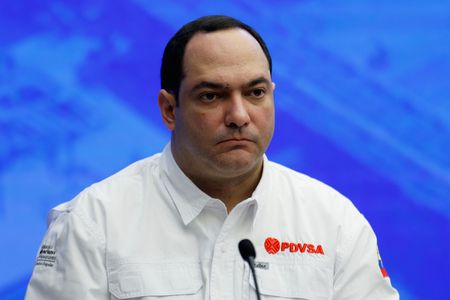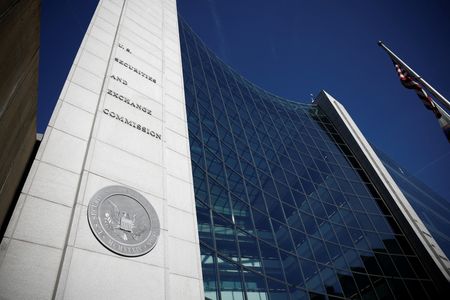By Jarrett Renshaw and Karol Badohal
WARSAW (Reuters) -U.S. President Joe Biden said that Russia’s leader Vladimir Putin “cannot remain in power” in Poland Saturday, remarks a White House official said later were meant to prepare the world’s democracies for extended conflict over Ukraine, not back regime change in Russia.
Biden’s comments on Saturday, including a statement earlier in the day calling Putin a “butcher,” were a sharp escalation of the U.S. approach to Moscow over its invasion of Ukraine.
In a major address delivered at Warsaw’s Royal Castle, Biden evoked Poland’s four decades behind the Iron Curtain in an effort to build a case that the world’s democracies must urgently confront an autocratic Russia as a threat to global security and freedom.
But a remark at the end of the speech raised the spectre of an escalation by Washington, which has avoided direct military involvement in Ukraine, and has specifically said it does not back regime change.
“For God’s sake, this man cannot remain in power,” Biden told a crowd in Warsaw after condemning Putin’s month-long war in Ukraine.
A White House official said Biden’s remarks did not represent a shift in Washington’s policy.
“The President’s point was that Putin cannot be allowed to exercise power over his neighbours or the region,” the official said. “He was not discussing Putin’s power in Russia, or regime change.”
Asked about Biden’s comment, Kremlin spokesman Dmitry Peskov told Reuters: “That’s not for Biden to decide. The president of Russia is elected by Russians.”
Calling the fight against Putin a “new battle for freedom,” Biden said Putin’s desire for “absolute power” was a strategic failure for Russia and a direct challenge to a European peace that has largely prevailed since World War Two.
“The West is now stronger, more united than it has ever been,” Biden said. “This battle will not be won in days or months, either. We need to steel ourselves for the long fight ahead.”
The speech came after three days of meetings in Europe with the G7, European Council and NATO allies, and took place roughly at the same time as rockets rained down on the western Ukrainian city of Lviv, just 60 kilometres (40 miles) from the Polish border.
“Their brave resistance is part of a larger fight for essential democratic principles that unite all free people,” Biden said. “We stand with you. Period.”
In his speech, Biden said NATO is a defensive security alliance which never sought Russia’s demise and he reiterated that the West has no desire to harm Russia’s people even as its sanctions threaten to cripple their economy.
Poland was under communist rule for four decades until 1989 and was a member of the Moscow-led Warsaw Pact security alliance. It is now part of the European Union and NATO.
The rise of right-wing populism in Poland in recent years has put it in conflict with the EU and Washington, but fears of Russia pressing beyond its borders has drawn Poland closer to its Western allies.
Speaking to a crowd holding U.S., Polish and Ukrainian flags, Biden said the West is acting in unison because of the “gravity of the threat” to global peace.
“The battle for democracy could not conclude and did not conclude with the end of the Cold War,” Biden said. “Over the last 30 years the forces of autocracy have revived all across the globe.”
Earlier in the day, Biden dropped in on a meeting with Ukraine’s foreign and defense ministers and made additional, unspecified security pledges on developing defence cooperation, according to Ukraine’s foreign minister, Dmytro Kuleba.
In Warsaw, Biden also visited a refugee reception centre at the national stadium. More than 2 million people have fled the war to Poland. Altogether, about 3.8 million have left Ukraine since fighting began.
Putin calls Russia’s military actions in Ukraine a “special military operation” to demilitarise and “denazify” the country.
(Reporting by Jarrett Renshaw and Karol Badohal in Warsaw and Trevor Hunnicutt in Washington, Additional reporting by Natalia Zinets in Lviv, Nandita Bose in Washington, Humeyra Pamuk, Alan Charlish, Justyna Pawlak and Joanna Plucinska in Warsaw and Kanishka Singh in Bengaluru; Writing by Trevor Hunnicutt; Editing by Heather Timmons, Grant McCool, Frances Kerry, Timothy Heritage, Nick Zieminski and Andrea Ricci)













